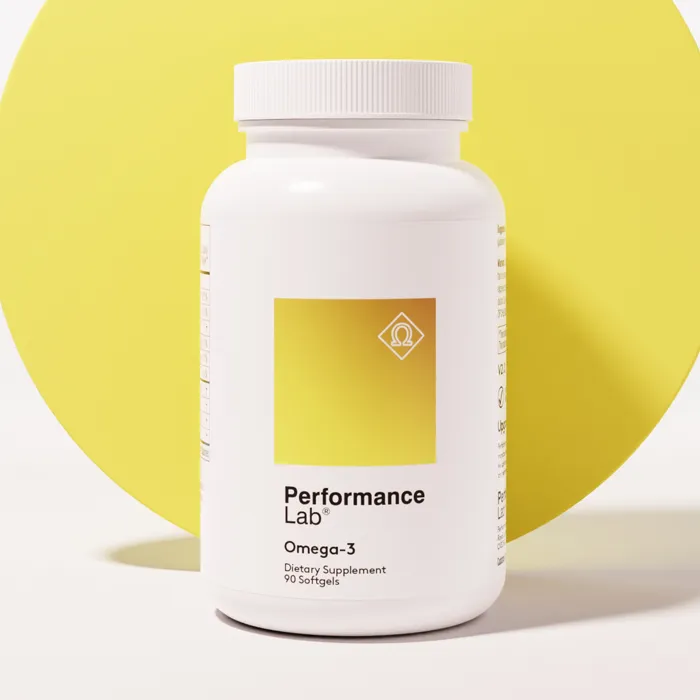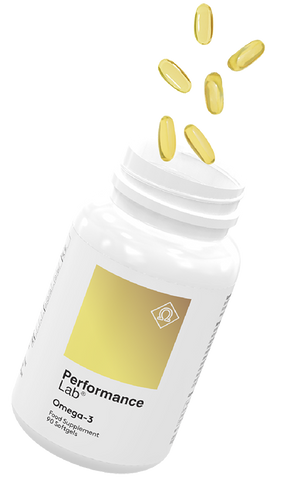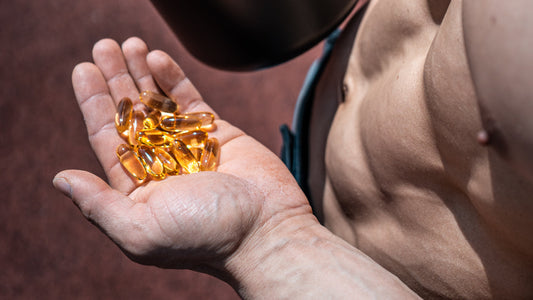As an athlete, you don't want your performance to be hindered by creaky and stiff joints, pain, inflammation, or other conditions—they can be detrimental to your performance, and potentially your career.
And if you already spend hours stretching and foam rolling, then you know how tedious upkeep and recovery can be.
How do you avoid that?
Get yourself some EFAs. They're a game-changer.
And it's safe to say that an EFA supplement is something that should be non-negotiable, whether you're an athlete or not.
Luckily, the best Omega-3 supplements help you reach your daily intake of EFAs with ease.
Key Takeaways
- Athletic needs for EPA+DHA often exceed general intakes—personalize to training load and diet.
- Fish-free algal omega-3s provide consistent, clean EPA/DHA without contaminants.
- Daily, split dosing with meals enhances tolerance and steady status.
- Track recovery, soreness, and HRV as practical feedback markers.

What are Omega-3s?

Omega 3s, also called essential fatty acids, are a type of polyunsaturated fat that the body cannot produce, so it must be obtained through diet or supplements.
The two we most frequently hear about are EPA (eicosapentaenoic acid) and DHA (docosahexaenoic acid). These both play several critical roles in the body.
Plant-based Omega-3s
Plant-based omega-3s are generally sourced from algae—a sustainable, environmentally friendly, potent source of EPA and DHA. Algae is one of the cleanest, purest, and most sustainable options for EFAs.
However, if you see any that are ALA-based, don't bother. While ALA can be converted to EPA and DHA, the conversion rate is highly inefficient, so it's not worth your time or money.
Fish Oil Omega-3s
Marine omega-3s, commonly seen as fish oils, are omega-3s sourced from fish, usually sardines, herring, and anchovies, whereby the oils are extracted from their tissues.
The problem with fish oil supplements is that they have a high potential for rancidity, they're low potency, have poor sourcing, are contaminated with heavy metals and pesticides, and are harvested in an unsustainable manner.
Why Omega-3s are Essential for Athletes
Daily, you probably put your body through hell and high water training several times a day, on top of everything else you have to accomplish.
And while you may be serious about recovery practices, incorporating an omega-3 supplement into your probably pre-existing supplement regime should be no sweat.
If you're not taking one, here's why you should be:
They Support Your Nervous System
The nervous system is the basis for your body function. If it's not working correctly, your body won't function optimally, and your performance is definitely going to suffer.
EFAs are an essential component of phospholipids that make up neuronal cell membranes and help to regulate membrane fluidity 1.
If your nervous system isn't performing optimally, it can't send signals to increase blood flow and oxygen supply to working skeletal muscles, leaving you feeling weak and exhausted 2.
They Boost Brain Health
Have you been hit in the head one too many times? An omega-3 supplement could help that.
While it won't protect your noggin from future hits (that's on you), polyunsaturated fats like EPA and DHA are neuroprotective.
A growing body of evidence points towards the benefit of EPA on mood, and DHA maintaining brain health and reducing the development of neurodegenerative disorders 3.
The combination of both EPA and DHA also appears to improve working memory, immediate verbal memory, and delayed recall memory 3.
Your brain is composed of over 60% fat, so just like the principle of homeopathic medicine suggests, treat like with like 4.
They Improve Your Vision
Your eyes are a critical part of your role as an athlete. Whether you're looking for an opponent coming to check you, or looking to see where to pass the ball, you need to protect your eyes.
DHA is concentrated in the retina of the eyes, and supplementation with it may help to protect the retina, reducing the risk of developing age-related macular degenerative disease.
It also helps to maintain the function of rhodopsin, a compound that enables low-light vision.
They Reduce Inflammation
Both EPA and DHA are known to be potent anti-inflammatories, and that's key with physical activity.
Every time you exercise, you cause micro-tears in your muscles that need to be repaired. And within this repair process is inflammation.
But not only this, the free radicals that are naturally produced by skeletal muscle during high-intensity exercise also increase levels of inflammation in the body, but not the good kind 2.
And when this doesn't subside, inflammation becomes chronic. Chronic inflammation not only impedes on your performance but also increases the risk of developing more serious chronic inflammatory conditions.
Omega-3s combat this by decreasing markers of inflammation like PGE2, leukotrienes, thromboxane, and prostacyclin.
They also increase the production of endogenous antioxidant enzymes such as catalase, glutathione peroxidase, and superoxide dismutase 5.
Not only that, but reducing inflammation is key to keeping your cardiovascular system healthy, which enables you to keep performing as you do.
Excess inflammation can lead to damage of blood vessels, which increases your risk of cardiovascular disease 6.
They Boost Your Recovery
And finally, we get to one of the most critical aspects of your performance as an athlete.
You can eat healthily and exercise all you want, but if you're not recovering properly, your performance won't be where you want it.
Research shows that supplementing with omega-3 fatty acids helps to attenuate loss of muscle strength and improves range of motion.
It also minimizes delayed-onset muscle soreness that results from strenuous eccentric strength exercise and maintaining proper muscle function after eccentric exercise-induced muscle damage 7, 8.
Did you ever think a capsule could do all that?
How Much Omega-3 Should I Be Taking?
Studies suggest that most athletes can benefit from a daily intake of a minimum 1-2g of combined EPA and DHA. (9,10)
Even though there aren't any official athlete-specific recommendations, the International Olympic Conference (IOC) advises approximately 2g of Omega-3s per day, which is in line with established research. (11)
In a study with professional rugby players, adding 1.5g of Omega-3s to their protein shakes over 5 weeks led to reduced lower-body soreness and fatigue along with enhanced neuromuscular performance. (12)
Another study found that 2g/day of algal oil (500mg DHA) reduced markers of muscle damage (serum CK levels) and inflammation (IL-6 response) right after intense exercise. (13)
The dosages used in research may vary depending on the type and intensity of activity, as well as the goals of the study. Overall, taking a minimum of 1-2g of Omega-3s each day can likely help athletes perform better and recover faster.
Now that you know how much you should take, what should you be looking for?
Finding the Right Omega-3 Supplement

Performance Lab Omega 3 is designed for performance—plain and simple.
It's a clean, pure, and 100% plant-based omega-3 supplement derived from algae that contains the ideal ratio of DHA:EPA to support athletic performance.
It's produced from non-GMO algae, contains no toxins or harsh contaminants, and is highly environmentally friendly and sustainable.
References
- Swanson D, Block R, Mousa SA. Omega-3 fatty acids EPA and DHA: health benefits throughout life. Adv Nutr. 2012 Jan;3(1):1-7. doi: 10.3945/an.111.000893. Epub 2012 Jan 5. PMID: 22332096; PMCID: PMC3262608.
- Gammone MA, Riccioni G, Parrinello G, D'Orazio N. Omega-3 Polyunsaturated Fatty Acids: Benefits and Endpoints in Sport. Nutrients. 2018 Dec 27;11(1):46. doi: 10.3390/nu11010046. PMID: 30591639; PMCID: PMC6357022.
- Dyall SC. Long-chain omega-3 fatty acids and the brain: a review of the independent and shared effects of EPA, DPA and DHA. Front Aging Neurosci. 2015 Apr 21;7:52. doi: 10.3389/fnagi.2015.00052. PMID: 25954194; PMCID: PMC4404917.
- Chang CY, Ke DS, Chen JY. Essential fatty acids and human brain. Acta Neurol Taiwan. 2009 Dec;18(4):231-41. PMID: 20329590.
- Simopoulos AP. Omega-3 fatty acids and athletics. Curr Sports Med Rep. 2007 Jul;6(4):230-6. PMID: 17617998.
- Mohebi-Nejad A, Bikdeli B. Omega-3 supplements and cardiovascular diseases. Tanaffos. 2014;13(1):6-14. PMID: 25191488; PMCID: PMC4153275.
- Shei RJ, Lindley MR, Mickleborough TD. Omega-3 polyunsaturated fatty acids in the optimization of physical performance. Mil Med. 2014 Nov;179(11 Suppl):144-56. doi: 10.7205/MILMED-D-14-00160. PMID: 25373099.
- Jouris KB, McDaniel JL, Weiss EP. The Effect of Omega-3 Fatty Acid Supplementation on the Inflammatory Response to eccentric strength exercise. J Sports Sci Med. 2011 Sep 1;10(3):432-8. PMID: 24150614; PMCID: PMC3737804.
- Tartibian B, Maleki BH, Abbasi A. The effects of omega-3 supplementation on pulmonary function of young wrestlers during intensive training. J Sci Med Sport. 2010 Mar;13(2):281-6. doi: 10.1016/j.jsams.2008.12.634. Epub 2009 Jun 12. PMID: 19523875.
- Hingley L, Macartney MJ, Brown MA, McLennan PL, Peoples GE. DHA-rich Fish Oil Increases the Omega-3 Index and Lowers the Oxygen Cost of Physiologically Stressful Cycling in Trained Individuals. Int J Sport Nutr Exerc Metab. 2017 Aug;27(4):335-343. doi: 10.1123/ijsnem.2016-0150. Epub 2017 Mar 24. PMID: 28338369.
- Maughan, R. J., Burke, L. M., Dvorak, J., Larson-Meyer, D. E., Peeling, P., Phillips, S. M., Rawson, E. S., Walsh, N. P., Garthe, I., Geyer, H., Meeusen, R., van Loon, L., Shirreffs, S. M., Spriet, L. L., Stuart, M., Vernec, A., Currell, K., Ali, V. M., Budgett, R. G., Ljungqvist, A., Mountjoy, M., Pitsiladis, Y., Soligard, T., Erdener, U., & Engebretsen, L. (2018). IOC Consensus Statement: Dietary Supplements and the High-Performance Athlete. International Journal of Sport Nutrition and Exercise Metabolism, 28(2), 104-125. Retrieved Sep 27, 2023, from https://doi.org/10.1123/ijsnem.2018-0020
- Black KE, Witard OC, Baker D, Healey P, Lewis V, Tavares F, Christensen S, Pease T, Smith B. Adding omega-3 fatty acids to a protein-based supplement during pre-season training results in reduced muscle soreness and the better maintenance of explosive power in professional Rugby Union players. Eur J Sport Sci. 2018 Nov;18(10):1357-1367. doi: 10.1080/17461391.2018.1491626. Epub 2018 Jul 9. PMID: 29985775.
- DiLorenzo FM, Drager CJ, Rankin JW. Docosahexaenoic acid affects markers of inflammation and muscle damage after eccentric exercise. J Strength Cond Res. 2014 Oct;28(10):2768-74. doi: 10.1519/JSC.0000000000000617. PMID: 25029008.
















